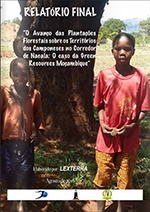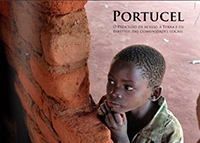updated on September 22
Last week we asked your support for communities in Mozambique who are facing rapid expansion of timber monoculture plantations in their territories.
This message is to inform you that this Action Alert will continue open for sign-on´s until September 29. If you haven’t sent your endorsement yet, please do so!
Justiça Ambiental and WRM together have launched this Action Alert urging the main companies promoting tree plantations in Mozambique, especially the Norwegian Green Resources and the Portuguese Portucel/The Navigator Company, to stop the expansion over people’s territories.
 We would also like to inform you that yesterday, on the occasion of September 21st – International Day of Struggle against Tree Monocultures – , two important reports have been launched in Maputo, Mozambique, about the two companies highlighted in the Action Alert: Green Resources and Portucel Moçambique.
We would also like to inform you that yesterday, on the occasion of September 21st – International Day of Struggle against Tree Monocultures – , two important reports have been launched in Maputo, Mozambique, about the two companies highlighted in the Action Alert: Green Resources and Portucel Moçambique.
The first study launched is called “the Advance of Tree Plantations over the Territories of Peasants in the Corridor of Nacala: the case of Green Resources Mozambique” (In Portuguese: “o Avanço das Plantações Florestais sobre os Territórios dos Camponeses no Corredor de Nacala: o caso da Green Resources Moçambique”). The study has been produced by the Mozambican organisations Livaningo, UNAC (União Nacional dos Camponeses) and Justiça Ambiental. To access this report, in Portuguese, click here
 The second study launched is called “Portucel – the Process of the access to Land and the rights of communities” (In Portuguese: “Portucel - O Processo de acesso à Terra e os direitos das comunidades”). The study has been produced by Justiça Ambiental,. To access this report, in Portuguese, click here
The second study launched is called “Portucel – the Process of the access to Land and the rights of communities” (In Portuguese: “Portucel - O Processo de acesso à Terra e os direitos das comunidades”). The study has been produced by Justiça Ambiental,. To access this report, in Portuguese, click here
The event took place in the presence of community representatives from areas where the aforementioned companies are active and the studies were carried out.
We reiterate to please support their struggles by signing the Action Alert below and sending your endorsement as soon as possible to: Mozambique@wrm.org.uy , including your name, organization or group and country.
Stop plantations expansion in Mozambique!
The WRM Team
LETTER TO BE SENT
To:
Green Resources
Att: Managing director – Mr. Mads Asprem
The Navigator Company/Portucel Mozambique
Att: Chairman of the Executive Commission– Mr.Diogo da Silveira
Ministério da Terra, Ambiente e Desenvolvimento Rural of Mozambique
Att: Mr. Minister, Celso Correia
Ministério da Agricultura e Segurança Alimentar of Mozambique
Att: Mr. Minister José Pacheco
Eastern and Southern African countries are increasingly seen by Northern companies and finance capital investors as attractive to earning easy profits by putting vast areas of lands under tree monocultures, like eucalyptus and pine. Companies are attracted by cheap land and labour, by environmental rules often less rigid and wood productivity per hectare significantly higher than, for example, in Europe. The favorable growing conditions are a result of availability of and access to fertile lands and water, as well as a beneficial climate.
Due to these characteristics, the fertile lands of interest to plantation companies in Eastern and Southern African countries tend to be part of territories from which communities secure and reproduce their living and livelihoods and supply local markets with food products they grow. The direct result of converting these lands into monoculture tree plantations is most often grave land conflicts where communities resist the invasion of their territories.
Unfortunately, national governments in Eastern and Southern Africa, instead of defending the interests of rural peasant communities, facilitate plantation companies' access to areas with fertile lands, even though these are usually under control and used by local communities. In a number of places, establishment of tree plantations has led to the immediate or gradual displacement of entire communities. Where communities succeed to resist and defend their homes but lose their territories to the tree monoculture plantations of a company, they will at some point start to perceive –among others- impacts on their water supply. The South African experience over the years with large-scale tree monoculture plantations of eucalyptus and pine severely affecting water sources in that country is a worrying and very didactic example. This excessive use of water by tree monocultures is even more of a concern in the context of climate change and the recent and very long dry period that has been affecting large parts of the region. Plantation companies and governments often promise employment opportunities to communities affected by industrial monoculture tree plantations. However, the jobs that do materialize are often temporary and poorly paid, and do not compensate for the simultaneous loss of agricultural lands and food sovereignty. The already severe impacts of industrial tree plantations on communities are even more severe for women, who are the ones responsible for food production and water collection in many communities.
The many negative impacts that plantation companies cause do not hinder these companies from obtaining certification for their plantations. The FSC (Forest Stewardship Council) is one of the certification schemes widely used in the plantations industry. It is a powerful tool in the hands of plantation companies because it declares their plantations “sustainable”; in other words, it suggests they do not cause harm to communities or violate community rights – while the opposite is true in many, if not most, cases where large-scale monoculture tree plantations have been established. This certificate has become an increasingly important prerequisite for plantation companies to secure funding from Northern finance capital investors. Nevertheless, communities affected by plantations that are certified by FSC-accredited consultancy firms –paid for their services by the plantation companies - continue to face most of the same problems as before certification because FSC does not see the ´monoculture´ and the ´large-scale´ character of industrial tree plantations, nor unresolved land rights conflicts as an obstacle for certification. Yet, these are exactly the main characteristics responsible for most of the negative impacts of plantations. In practice, plantations companies benefit from the FSC which helps paint a shiny but false image of a harsh reality. It is this rosy picture of "sustainability" that helps plantation companies secure investors’ money and continue expanding.
Among the many companies promoting large-scale industrial tree plantations in Eastern and Southern African countries, we would like to highlight two companies: the Norwegian company Green Resources (GR) and Portucel Moçambique, owned by the Portuguese The Navigator Company. GR is active in several countries in the region. The reason to highlight these companies is due to the fact that they are among the most active in the region. Therefore, their activities are already having severe negative impacts on local communities, impacts that will be aggravated even further if the expansion announced by these companies is not halted.
Green Resources (GR) is active in Mozambique, Tanzania and Uganda. In Mozambique Green Resources has acquired, between 2005 and 2009, land use titles for 264,898 hectares of land in three provinces, Nampula, Niassa and Zambézia. Until today, around 10% of the total area has been planted, predominantly in close proximity to villages, main roads and water resources all used by local communities. There has been no use of marginal or degraded land, contrary to what is usually claimed by companies and governments. All communities visited during a field investigation that resulted in a report expected to be released this month of September (1), have raised several complaints, ranging from false promises about benefits to land grabbing.
Portucel Moçambique, in turn, has announced construction of a huge pulp mill project and is therefore expanding large-scale tree plantations in Mozambique, targeting an area of 356,000 hectares in the central provinces of Zambézia and Manica. Although only a small portion of the total area has been planted to date, there are already conflicts with local communities, mainly due to inadequate community consultation processes; false promises of employment and improved living conditions; land grabbing and competition for fertile land used for food production; inappropriate compensation for land lost to the company; and complaints regarding reduced water availability following the establishment of the plantation.(2)
Communities in Eastern and Southern Africa that through the establishment of plantations by companies like GR, Portucel and others lose the control over their territories and see themselves being fenced in by plantations often resist. In many instances, they do so without any or with very little outside support, and their struggles thus often remain invisible. The trend is that ever more communities face such a situation as a result of several large-scale so-called “reforestation” plans launched in the past few years, such as the African Forest Landscape Restoration Initiative (AFR100).
The AFR100 was launched in parallel to the climate conference in France last year. It has access to US$ 1 billion in support from the World Bank, besides contributions from other public and private funders. AFR100 claims that it will support the mitigation of climate change and improve livelihoods. But the experience with top-down and profit-driven “reforestation” projects and plans promoted by the World Bank and FAO in the Global South in the past decades – and the AFR100 appears to have much of the same characteristics – shows that such projects result in more large-scale tree monocultures that benefit a tiny group of corporations, investment funds and consultants, while jeopardizing the huge majority of rural communities living in those areas targeted by these "reforestation" projects and plans. As a result of such initiatives, communities tend to remain without lands, without food and without water.
We, undersigned organizations, groups, movements and individuals, on the occasion of September 21st, the International Day of Struggle against Tree Monocultures, express our solidarity and support to the communities standing up against the expansion of large scale monoculture tree plantations. We demand that Green Resources, Portucel and all other companies and finance capital investors that are grabbing or planning to support the grabbing of fertile agricultural lands for monoculture tree plantations in Eastern and Southern Africa give back the land to the communities. By doing so, they can contribute to preventing new and solving the many existing conflicts with communities across the region. We demand that the Government of Mozambique upholds its Land Law and ensures that community rights to land, water and food are duly respected.
September 21st - Plantations are not Forests!
Please send your endorsement to the following email address: Mozambique@wrm.org.uy
Include your name, organization and country.